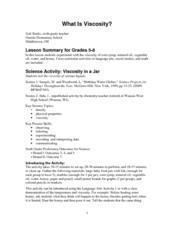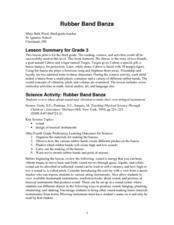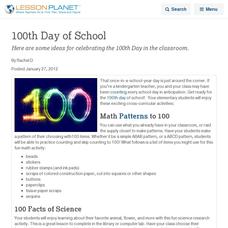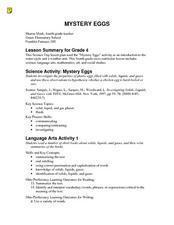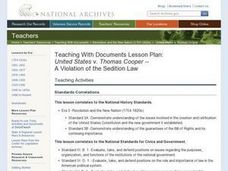Curated OER
Commotion About Motion
Second graders are introduced to different types of motion. They make rolling spider toys and race them on different surfaces to invsetigate forces and motion. Pupils make glue "spider webs" for their spiders after testing different...
Curated OER
What Is Viscosity?
Students experiment with the visocosity of corn syrup, mineral oil, vegetable oil, water, and honey. They research viscosity before beginning. Pupils draw the conclusion that the marble sinks more slowly in the liquids with greater...
Curated OER
Rubber Band Banza
Third graders review ideas about sound and vibration to make their own stringed instrument. They review what a pictograph and bar graph are. Pupils conduct a survey within the classroom to choose the four favorite string instruments and...
Curated OER
Understanding the Water Cycle
Investigate the water cycle and how water moves from the land to the air and back to the land. Create a terrarium and observe the water cycle at work. Define weather terms including evaporation, condensation, and precipitation.
Curated OER
Do Touch!
Students explore the sense of touch. They investigate unknown solids using the sense of touch. Pupils use their senses of touch to match feely gloves. Students explore body parts, by tracing their hands and feet on paper. They create a...
Curated OER
FDR's First Inaugural Address
Students, in groups, describe a photo to the class. They determine which New Deal program is depicted in each of the images based on the research they conducted.
Curated OER
D-day Message from General Eisenhower to General Marshall
Students analyze a "top secret" document written by Eisenhower. They identify and chart cliches for those about to go into battle and read related poetry. They invite a veteran to describe the D-Day invasion.
Curated OER
Images of the American Revolution
High schoolers analyze several documents as they research the Revolutionary War. They evaluate documents and examine them for bias and perspective. They use their research to write monologues from the point of view of a famous...
Curated OER
Black Soldiers in the Civil War
Young scholars explain how a history of slavery distinguishes American society from other societies. They study posters and documents from different eras in our history which document the practice of slavery, and civil rights violations.
Curated OER
The Civil War as Photographed by Mathew Brady
Students gain historical background on the Civil War era from textbooks, encyclopedias, or supplemental material. Assign at least two photographs for each student to analyze using the Photograph Analysis Worksheet which is imbedded in...
Curated OER
Photograph and Pamphlet About Nuclear Fallout
Students explore the term, 'nuclear fallout.' They analyze the "Facts about Fallout" pamphlet and list any questions that either were not answered by the pamphlet or arose as a result of materials provided.
Curated OER
Constitutional Issues: Watergate and the Constitution
Learners take and defend positions on what conditions contribute to the establishment and maintenance of a constitutional government. They debate whether or not the government should have prosecuted Nixon over the Watergate scandal.
Curated OER
Political Cartoons Illustrating Progressivism and the Election of 1912
High schoolers study a current political cartoon to introduce the ideas of symbolism, humor, exaggeration, and caricature in editorial cartoons. They study cartoons from the past to gain an understanding of the culture of 1912.
Curated OER
Photographs of the 369th Infantry and African Americans during World War I
High schoolers engage in a discussion regarding images of war we see, how quickly do we see them, and how they affect us? They view and analyze war photographs taken during World War I.
Curated OER
Memorandum Regarding the Enlistment of Navajo Indians
Students examine the Navajo dictionary used by the U.S. military in W.W. II. They role-play Navajo messengers and Marine Corp staff. They research the Battle of Iwo Jima and confirm or discount the claim that Navajos made the victory...
Curated OER
The Many Faces of Paul Robeson
Students discuss and construct timelines based on the life of author/performer/Civil Right's activist, Paul Robeson. They view photographs of him at various times in his life and discuss the roles he may have been playing at those times.
Curated OER
Let's Travel
Students engage in Internet search. They find answers to questions concerning an assigned country. They create a video presentation about a foreign country. They design a display about the foreign country.
Curated OER
Class of Gold
How can you see a number in nature? Here, learners discover both Fibonacci numbers and the golden ratio by exploring a number of different resources. Note: Some of the resources are older and may be missing some of the links, but the...
Curated OER
Let Pharady Enjoy Her Childhood
A thought-provoking lesson which will provide your 5th graders with a world view. Pupils discuss children's rights here in the US and around the world, and do some comparisons. They watch a video, embedded in the plan, that shows a young...
Curated OER
Mystery Eggs
Students investigate the properties of plastic eggs filled with solids, liquids, and gases and use these observations to hypothesize whether a chicken egg is hard-boiled or raw.
Curated OER
The Exploration of the Writer, His Louisiana History And the Autobiography of Miss Jane Pittman By Ernest J. Faines
Students identify the significance of the author's experiences on his written work; describe the hardships faced by slaves and plantation owners once the caves were set free; explain the role of the Seceses and why they were a threat to...
Curated OER
Petition of Amelia Bloomer Regarding Suffrage in the West
Students investigate the role of Amelia Jenks Bloomer in the struggles for suffrage and political reform. They consider the factors involved in political socialization and compile webliographies of their research materials.
Curated OER
United States v. Thomas Cooper --
Students compare the Alien and Sedition Act to the First Amendment. They read and analyze a primary document and write a synopsis. They brainstorm challenges to the Government or President of the US.



